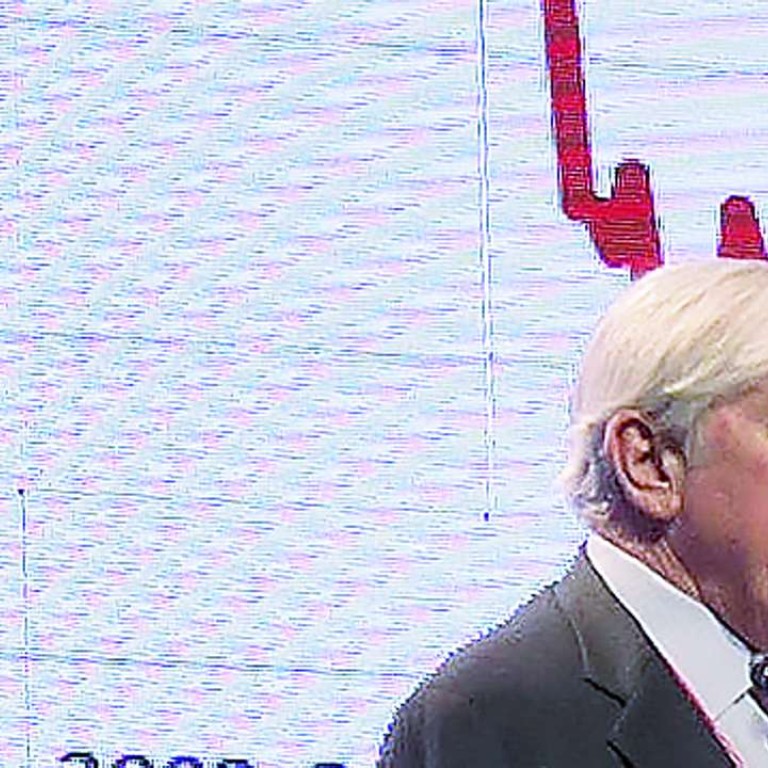
Mobile applications have little economic impact, economist Gordon says
Uber and online bed and breakfast programmes are a small part of the overall economy, he tells Seoul conference.
Taxi drivers may be unhappy with Uber, hotel owners may dislike the many online short-term flat-rental applications for mobile phones, but US economist Robert Gordon said these are not likely to hurt the wider economy.
Gordon, a social science professor at Northwestern University in the US state of Illinois, told the Asian Leadership Conference in Seoul these mobile applications are just a small part of the economy and their impact won’t spread wider than computers or mobile phones.
The South China Morning Post is a media partner in the conference.
“Uber mainly affects taxi drivers, while in fact taxis represent only a small percentage of all types of transportation,” Gordon said. “The online bed and breakfast sharing website may affect business in the hotel sector, but it will not affect any other sector. There has been a lot of controversy recently about these technologies, yet I do not think they will have a big impact on the overall economy.”
The popularity of the mobile application Uber — which can help customers to get hired car services —
has brought protests from taxi drivers worldwide, including in Hong Kong. They have brought demands that the application be removed from the market.
The online bed and breakfast-sharing websites which allow people to sub-let their spare rooms for short-term living by others via a website, have faced criticism from the hospitality industry and some people have called for tougher regulation.
Gordon said personal computers and mobile phones have a much wider impact on the economy because they are widely used.
He said these new innovations have changed the way companies do business, such as airlines that use self-help kiosks for passengers to check or companies that use computerisation to reduce staff costs.
He however does not think technology will replace all jobs.
“This is just like when we had the ATM machines in the 1980s. People thought this would replace bank tellers. But we still have a lot of bank tellers nowadays,” he said.
In a similar situation, there are some driverless cars, but in fact the drivers do not only drive the car or truck, they unload the goods for supermarkets or companies, which are jobs that are needed to be done by humans.
Gordon said the many innovations that have appeared in the past twenty years are not revolutionary.
The internet, email, computers or touch-screen phones, drive economic growth only modestly and do not substantially raise living standards. By comparison the invention of electricity, the telephone and other electronic products from the last century have added much more to economic growth, he said.
The US has had slow growth over the past five years as a result. Gordon said innovation will continue, though the impact on the world’s economic growth will be small.
The US economy, the world’s largest, will face certain headwinds, including a widening gap of rich and poor and an ageing population.
The use of internet or mobile devices may be a sign of a smart and trendy lifestyle, but they fail to bring higher incomes to everybody.
Only some chief executives or movie stars get multimillion dollars of huge salaries, the bottom 99 per cent of people still face a wide gap from the top one per cent of income earners, Gordon said.
“In the US, there are millions of people who are doing part time jobs even though they want full-time ones,” he said.
An ageing population is another problem as many baby boomers —those born just after the second world war — are approaching their 70s and retiring. This has reduced the labour force and driven government spending on medical care higher.
The gap between rich and poor affects life expectancy.
The richest in the US on average will live to the age of 87 while their poorer counterparts will, on average, only live to 73.
To solve the ageing population problem, which is also a problem in Asian countries including South Korea, Gordon recommended governments should raise the retirement age. Gordon is now 75 and still working.
“The only advice I could give to Korea is to extend the retirement age. It is ridiculous for people to retire at 55 or 60. Nowadays, many people are still very healthy and fit to work at their 60s or 70s. It is a waste of talent to force people to retire early,” Gordon said.

